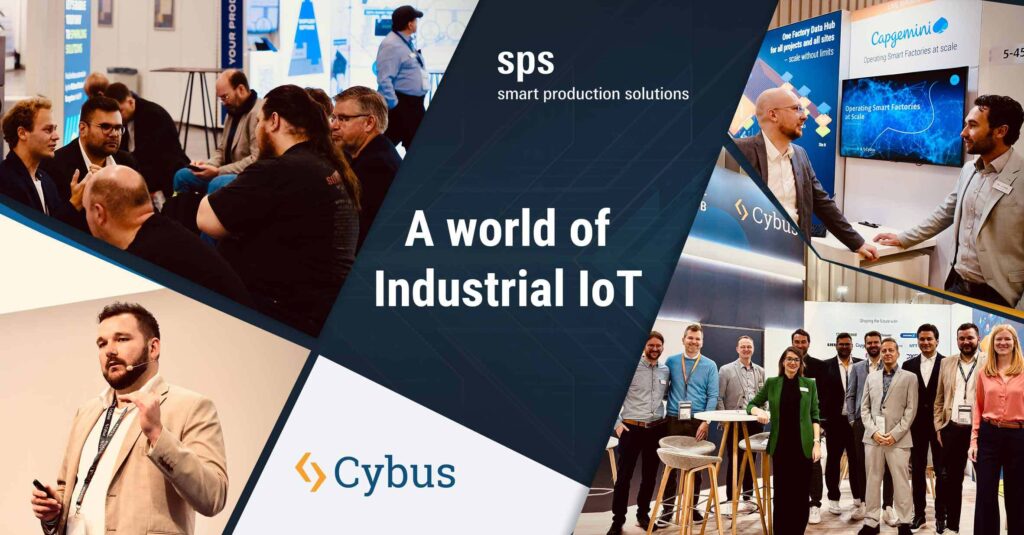-
-
Insights & knowledge
For users
Support
-
Ecosystem
About Cybus
News | 22.11.2024

SPS 2024 Smart Production Solutions in Nuremberg is over and it’s time for a quick recap. As we expected, SPS 2024 proved to be an exciting event, rich with insights into the future of industrial automation and digital transformation. This year we had the pleasure of presenting groundbreaking topics such as Unified Namespace, DevOps in manufacturing and sustainable production – engaging in valuable discussions with industry experts.
The event also showcased practical use cases, as you requested in many valuable conversations with us. In collaboration with our partners MaibornWolff, Capgemini and TeamViewer, we highlighted real-world applications that are driving innovation in manufacturing. From inspiring keynotes to meaningful conversations, SPS 2024 was a platform to exchange ideas and explore the latest advancements shaping the industry.
We look forward to continuing these conversations with you and driving forward-thinking solutions for the future of manufacturing.
Here is a summary of the most important takeaways for you to consider.

The live showcase in partnership with MaibornWolff, demonstrated how manufacturers can overcome the challenges of integrating and scaling machine connections and data flows in real time.
The GitOps demonstrator highlighted the power of an Infrastructure-as-Code (IaC) approach to modern manufacturing. This approach enables centralized management of machine connections and seamless scalability to additional machines or entire factories. As a result you can expect efficient and reliable operations, even in highly dynamic and complex manufacturing environments.
The showcase provided a deep dive into manufacturing automation and demonstrated how future-proof, scalable solutions can be implemented quickly and securely. By ensuring the seamless integration of data from multiple sources, the demonstrator highlighted the backbone of a sustainable, modern manufacturing facility.

In a live demo Cybus and TeamViewer showed how to bridge IT and OT in automotive manufacturing. The showcase focused on real-time assembly monitoring and scalable infrastructure that enables manufacturers to seamlessly connect systems and data across multiple production sites.
The solution synchronizes back-end systems via API integration, ensuring smooth data flow and efficient task management. This showcase demonstrates impressively how you can use real-time monitoring to gain complete visibility into critical production metrics, make faster and more informed decisions, eliminate inefficiencies and significantly reduce downtime.
Take a look at the summary of the showcase now:

Focusing on real-world examples from battery cell manufacturing, this showcase by Capgemini highlighted the path to scalable smart factory systems. It demonstrated how manufacturers can standardize operations, seamlessly integrate data and efficiently scale across multiple facilities.
By addressing key challenges such as maintaining quality, reducing waste and optimizing production, the showcase provided practical insights into building smart, resilient factories. While the focus was on battery manufacturing and greenfield environments, the solutions are applicable to any industry seeking to achieve smart, efficient operations at scale.

In his keynote, Pathway to a Successful Company-Wide Smart Factory Initiative, our Industry Solution Architect, Benjamin Gehlken, explored the essential steps for achieving a resilient and sustainable smart factory transformation. The message was clear: technology alone isn’t the key to success. Instead, a smart factory must integrate people, process and technology in a balanced way to drive meaningful growth.
The strategy begins with setting data-driven goals and choosing adaptable, modular systems. Emphasis should be placed on change management and engaging employees as active participants in the transformation journey. This ensures that everyone is aligned with the goals. In addition, financial incentives reinforce long-term commitment and keep the organization competitive.
Benjamin emphasized that lean process development, realistic ROI assessments, and a commitment to continuous transformation are fundamental to maintaining a competitive edge. By following these steps you can build a sustainable foundation for your smart factory success and remain agile in a rapidly evolving industrial landscape.

In his keynote, Achieving CSRD Compliance, Luca Stephan, Industry Solution Architect at Cybus, outlined the urgent need for robust data integration to meet the requirements of the Corporate Sustainability Reporting Directive (CSRD). As sustainability reporting becomes a critical mandate for industries, Luca explored how companies can overcome these challenges to ensure seamless compliance.
A key focus was on enabling efficient data collection, integration, and reporting from disparate industrial systems. Luca explained how real-time monitoring and reporting of environmental, social and governance (ESG) metrics plays a critical role in CSRD compliance. He highlighted the importance of reliable, automated data transformation to make data available for analysis. He also emphasized scalability, showing how companies can extend sustainability reporting to new production sites and assets with minimal configuration.
Luca emphasized the importance of security and privacy, especially when dealing with sensitive sustainability data. He explained how automating data collection, integration, and reporting can increase efficiency and allow sustainability teams to focus on strategic initiatives and continuous improvement.

In his keynote, Achieving Seamless Integration: Your Path to a Unified Namespace (UNS) for Smart Factories, Benjamin Gehlken, Industry Solution Architect at Cybus, addressed the critical need for manufacturers to create a scalable infrastructure. With ESG regulations, fluctuating market conditions, and economic challenges, manufacturers face complex requirements – not only to adopt digital technologies, but to integrate them into a unified and efficient framework.
Benjamin introduced the Unified Namespace (UNS) as solution: a single source of truth for all data within your manufacturing ecosystem. By establishing a UNS, you can achieve seamless integration across all your systems and processes, enabling efficient data flow and real-time insights. The keynote detailed the journey to implementing a UNS and positioned it as the cornerstone of digital transformation, essential for you if you want to optimize your shop floor, respond quickly to market shifts, and remain competitive in today’s dynamic industrial landscape.

In his keynote, DevOps meets Factory – Digital Transformation at High Speed and Large Scale, Danny Rybakowski, Head of Partner Management at Cybus, outlined how Industrial DevOps is reshaping digital transformation in manufacturing.
While the IIoT promises streamlined, scalable production, legacy systems and data silos often impede progress. Danny discussed how DevOps principles, including continuous integration and deployment, address these barriers by ensuring adaptable and efficient operations.
Industrial DevOps enables you as manufacturer to unify data flows across disparate systems, minimizing complexity and downtime. This approach improves collaboration between your IT and OT, accelerates deployment and optimizes scalability. You can connect and manage assets across multiple locations. By automating tasks and integrating security from the start, you can create a reliable foundation for high-speed, large-scale production transformation with Industrial DevOps.

In his keynote, From Hype to Reality: The DevOps Way to a Sustainable, Flexible Production, Luca Stephan, Industry Solution Architect at Cybus, demonstrated how Industrial DevOps is transforming manufacturing. With rapid deployment, continuous integration and efficient update management, this approach enables seamless IT and OT collaboration, streamlined workflows and faster problem resolution.
With tools like Docker for containerization and Kubernetes for orchestration, you can support scalable, adaptive operations tailored to complex industrial workloads. By leveraging Infrastructure as Code (IaC) you can ensure consistent and accurate infrastructure management right on the shop floor.
By integrating security best practices into DevOps processes and automating routine tasks such as asset integration and site expansion, you can minimize human error, streamline operations and make room for continuous innovation. Industrial DevOps provides a solid foundation for your scalable, sustainable production.

You need to load content from reCAPTCHA to submit the form. Please note that doing so will share data with third-party providers.
More InformationYou are currently viewing a placeholder content from Turnstile. To access the actual content, click the button below. Please note that doing so will share data with third-party providers.
More InformationYou are currently viewing a placeholder content from Facebook. To access the actual content, click the button below. Please note that doing so will share data with third-party providers.
More InformationYou are currently viewing a placeholder content from Instagram. To access the actual content, click the button below. Please note that doing so will share data with third-party providers.
More InformationYou are currently viewing a placeholder content from X. To access the actual content, click the button below. Please note that doing so will share data with third-party providers.
More Information